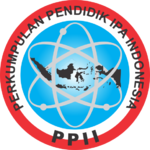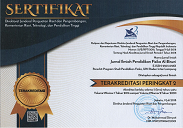Profile of Senior High School Metacognitive Ability in Solving Problems of Abstraction on Physics Material
Abstract
This study aims to determine the ability of students’ metacognition in solving abstract problems in physical material. The study involved students who took through the test. Metacognition ability data obtained through written test consisting of questions metacognitive knowledge and metacognition skills. Data analysis is done descriptively. The result of the research shows that declarative knowledge dominates students metacognition knowledge, that is students can recognize the difficult problem and able to interpret in other forms but less able to recognize method used and how to finish, while students' metacognition skills are more dominant in planning and monitoring fields. Prediction and evaluation skills are still relatively low. Overall, metacognition ability of students included in the low category.
Keywords
Full Text:
PDFReferences
Corebima, A. D. (2007). Metakognisi: Suatu Ringkasan Kajian, Makalah disajikan dalam Diklat Guru Mata Pelajaran Biologi di Yogyakarta.
Demİrcİ, N., & Çİrkİnoğlu, A. (2004). Determining Students’ Preconceptions/Misconceptions in Electricity and Magnetism. Journal of Turkish Science Education, 1(2), 51–54.
Desoete, A., Roeyers, H., & Buysse, A. (2001). Metacognition and Mathematical Problem Solving in Grade 3. Journal of Learning Disabilities, 34(5), 435–449. https://doi.org/10.1177/002221940103400505
Distrik, I W., Jatmiko, B., &Supardi, Z. A. . (2013). Strategi Pengajaran Metakognitif melalui Analogi dan Refleksi untuk Meningkatkan Kemampuan Metakognitif dan Pemahaman Konsep Fisika. In Prosiding Seminar Nasional FMIPA. ISBN: 978-6-0217146-6-9.
Distrik, I. W. (2013). Pemahaman Konsep dan Keterampilan Pemecahan Masalah Mahasiswa Calon Guru Pendidikan Fisika pada Materi Listrik Magnet. In Prosiding seminar Nasional. SBN:978-602-7508-55-2. (pp. 233–238).
Fazal, R. ur. (2011). Assessment of Science Teachers Metacognitive Awareness and its impact on the Performance of Students. Dissertation of Doctor of Departement of Secondary Teacher Education Faculty of Education Allama Iqbal Open University Islamabad.
Flavell, J. H. (1979). Metacognition and Cognitive Monitoring: A New Area of Cognitive-Developmental Inquiry. American Psychologist, 34(10), 906–911. https://doi.org/10.1037/0003-066X.34.10.906
Hacker, D. J. (2000). Metacognition: Definitions and Empirical Foundations.
Lee, M., and Baylor, A. L. (2006). Designing Metacognitive Maps for Web-Based Learning. Educational Technology & Society, 9(1), 344–348.
Lee, M. & Baylor, A. L. (2006). Designing Metacognitive Maps for Web-Based Learning. USA: Florida State University.
McLoughlin, C. & Hollingworth, R. (2003). Exploring a Hidden Dimension of Online Quality: Metacognitive Skill Development. In 16th ODLAA Biennial Forum Conference Proceedings.
Mur, J., Zaragoza, de Luna, M., Letosa, J., Samplón, M., & Artal, S. J. (2004). Teaching Electricity and Magnetism in Electrical Engineering Curriculum: Applied Methods and Trend. In International Conference on Engineering Education (pp. 1–11).
Panaoura, A., & Philippou, G. (2004). The Measurement of Young Pupils ́ Metacognitive Ability in Mathematics: the Case of Self-Representation and Self-Evaluation, 1–10.
Paris, S. G., & Winograd, P. (1990). Promoting Metacognition and Motivation of Exceptional Children. Remedial and Special Education, 11(6), 7–15. https://doi.org/10.1177/074193259001100604
Polya, G. (1973). How to Solve It. NewJersey: Princeton University Press.
Pressley M., Borkowski J. G, and. S. W. (1987). Cognitive Strategies: Good Strategy Users Coordinate Metacognition and Knowledge. Annals of Child Development.
Reynolds, R. E. (1992). Selective Attention and Prose Learning: Theoretical and Empirical Research. Educational Psychology Review, 4, 345–391.
Saregar, A., Diani, R., & Kholid, R. (2017). Efektivitas Penerapan Model Pembelajaran ATI (Aptitude Treatment Interaction) Dan Model Pembelajaran TAI (Team Assisted Individualy) : Dampak Terhadap Hasil Belajar Fisika Siswa. Jurnal Pendidikan Fisika Dan Keilmuan, 3(1), 28–35.
Saregar, A., Latifah, S., & Sari, M. (2016). Efektivitas Model Pembelajaran CUPs: Dampak terhadap Kemampuan Berpikir Tingkat Tinggi Peserta Didik Madrasah Aliyah Mathla’ul Anwar Gisting Lampung. Jurnal Ilmiah Pendidikan Fisika Al-Biruni, 5(2), 233–243. https://doi.org/10.24042/jpifalbiruni.v5i2.123
Schneider, W., & Artelt, C. (2010). Metacognition and Mathematics education. ZDM Mathematics Education, 42(2), 149.
Schraw, G., Crippen, K. J., & Hartley, K. (2006). Promoting Self-Regulation in Science Education: Metacognition as Part of a Broader Perspective on Learning. Research in Science Education, 36, 111–139. https://doi.org/10.1007/s11165-005-3917-8
Woolfolk, A. (1998). Educational Psychology (Seventh Ed). Boston: Allyn and Bacon.
DOI: http://dx.doi.org/10.24042/jipfalbiruni.v6i2.2061
Refbacks
- There are currently no refbacks.

Jurnal ilmiah pendidikan fisika Al-Biruni is licensed under a Creative Commons Attribution-ShareAlike 4.0 International License.
![]()







